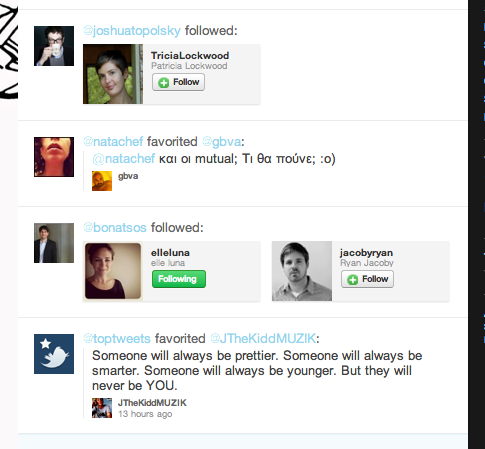“What’s happening?” The text entry box on the Twitter homepage innocently asks us constantly, compelling us to type in a <140 character window into what we’re doing RIGHT NOW. For the most part, if you’re an active Twitter user, you partake voluntarily, contributing to a real-time hum of over 200 million updates daily.
On the receiving end of these updates are people who’ve chosen to subscribe to your one way broadcasting of your constant status. Like it or not, they’ve opted in to what you ate for breakfast, read this morning, or think about the financial crisis in Europe.
Last week Facebook introduced features that seem intent on making this basic status posting function of Twitter look like a toy.
The most “Twitter-like” of these features, Ticker, sits docked at the right side of your Facebook profile and automatically scrobbles Facebook user activity including what songs people are listening to on services like Rdio and Spotify, whom users are Friending, what users are Liking, what photos they’re being tagged in and what they’re commenting on. Ticker may even eventually show app-specific activities like reading and hiking.
“Last year when we introduced the Open Graph, we added ‘nouns’ so you could like anything that you wanted, this year we added ‘verbs,’” Zuckerberg described the expanded Graph at F8 earlier this week, failing to mention that as of right now these “verbs” enable a mostly meaningless trickle of noise, parlaying disembodied friending activity and songs people listen on Spotify or Rdio.
ROBERT SCOBLE IS LISTENING TO “YOUR BODY IS A WONDERLAND” BY JOHN MAYER ON SPOTIFY, ad infinitum.
As comedian Chelsea Peretti notes, it’s almost like Facebook hopes, with Ticker, that its users will take the following stance, “I’ll quit Twitter since Facebook has this constantly updating feed of my friends activity on the upper right side now!”
Well, maybe not quit Twitter per se (that battle has already been lost), but spend more time on Facebook for damn sure.
But, while both start with a T and end in “er,” Twitter and Ticker elicit very diverse visceral reactions. As Facebook user Joe Braidwood put it, “One is a fast-moving source of genuine updates — the other is a feed of all the crap you wouldn’t usually care to pay attention to.”
Of course we’d rather follow the firehose of breaking news and glib commentary available in our Twitter feeds than become party to the fact that someone we met at a conference and someone we don’t know are now friends. Okay, so Twitter > Ticker.
But, in making fun of Ticker’s apparent uselessness, we forget that Twitter too has its own version of Ticker, the Activity Tab. Yes, you tend to forget the Twitter Activity Tab because it’s not in your face all the time, but it too shows the world your actions on a social network, if you click-through to it — it’s just as “stalker-like” as Ticker if you will.
Clearly both Twitter and Facebook have thought this thing through. And who is to say that the Twitter activity tab won’t one day achieve the same sort of Ticker-like prominence on the Twitter homepage? After all, Facebook was following much of this activity this whole time, just not making it visible.
With these sorts of real-time activity streams “the panopticon has reappeared with a chilling twist,” writes AJ Keen, referring to Jeremy Bentham’s idea of a Panoption, or the notion of a space where one was constantly observed. “ What was once an action is now passively taken care of for me,” The Verge’s Laura June brings up in her treatise on why she’s wary of Ticker.
June brings up a key point: before Ticker, it was your choice to update your Facebook status with your actions, and this new “frictionless” sharing of your activity feed takes that option away from you. And moreover disallows you the option of providing a context to your actions i.e. “I am listening to this Chumbawamba song IRONICALLY, GUYS!”
Knowing that your activity on a social network will be broadcast to your connections sans context in fact can cause friction, or more anthropomorphically defined, stress. Jason Kincaid writes, “[With] the addition of this new effortless sharing I’m going to deal with a nagging feeling in the back of my head wondering if I really want the article I just clicked on to be shared with friends. I think the word for that is stress, or maybe anxiety.”
Exactly. Now all we need is a technical term for the anxiety of no longer being judged by what you voluntarily publish, but what you involuntarily share.
Old school ticker image via: Investing Stockmarkets


